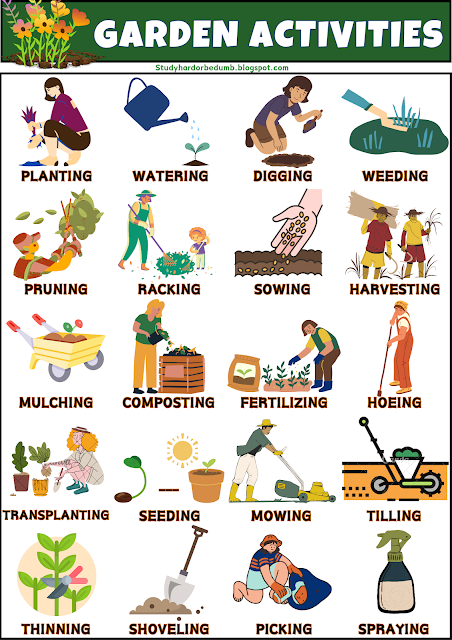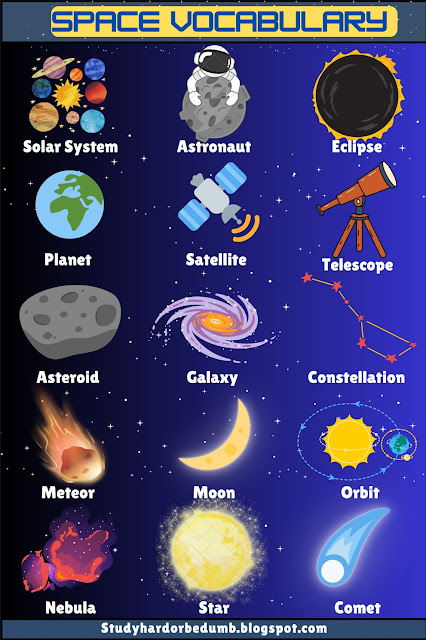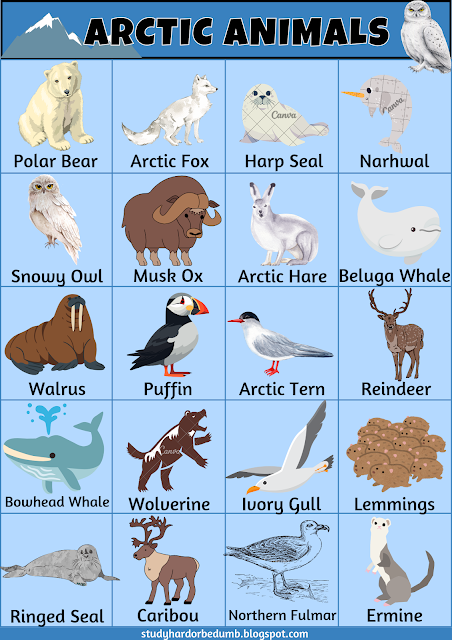Garden Vocabulary for Kids I Learn 80+ Garden terms with meaning and pictures
Gardening is a fantastic way for kids to learn about nature and enjoy the outdoors. Children have a great time in the garden. Let's explore some garden activities and expand our vocabulary with 80+ words related to gardening. Also included are some common idioms on gardens and plants.
Activities in a Garden
Planting - Putting seeds or plants in the soil to grow.
Watering - Giving water to plants.
Digging - Using a shovel to move soil.
Weeding - Removing unwanted plants from the garden.
Harvesting - Picking ripe fruits or vegetables.
Raking - Using a rake to gather leaves or smooth soil.
Pruning - Cutting back parts of plants to help them grow better.
Composting - Making a pile of organic waste to create soil.
Mulching - Adding a layer of material on the soil to retain moisture.
Fertilizing - Adding nutrients to the soil to help plants grow.
Hoeing - Using a hoe to remove weeds and break up soil.
Transplanting - Moving a plant from one place to another.
Sowing - Scattering seeds on the ground.
Thinning - Removing extra plants so others can grow better.
Mowing - Cutting the grass.
Seeding - Planting seeds in the soil.
Tilling - Turning over the soil to prepare it for planting.
Spraying - Applying water or pesticides with a spray.
Picking - Taking flowers, fruits, or vegetables from plants.
Shoveling - Using a shovel to move soil or compost.
Things Seen in a Garden
Flowerbed - A garden plot with flowers.
Greenhouse - A glass building where plants are grown.
Orchard - A place where fruit trees are grown.
Nursery - A place where plants are grown for sale.
Gardener - A person who takes care of a garden.
Herbs - Plants used for flavoring or medicine.
Shrubs - Small to medium-sized woody plants.
Vegetable Patch - A garden area for growing vegetables.
Perennials - Plants that live for more than two years.
Annuals - Plants that live for only one growing season.
Roots - The part of the plant that grows underground.
Stem - The main support of the plant.
Leaves - The part of the plant where photosynthesis happens.
Blossom - The flower of a plant.
Bud - An undeveloped or embryonic shoot.
Bulb - A rounded underground storage organ.
Vines - Plants with long, trailing stems.
Topsoil - The uppermost layer of soil.
Subsoil - The soil lying immediately under the surface soil.
Crops - Cultivated plants grown for food.
Pesticides - Chemicals used to kill pests.
Insects - Small creatures that can affect plants.
Pollination - The transfer of pollen from one flower to another.
Sunlight - Light from the sun that plants need to grow.
Shade - An area where sunlight is blocked.
Climate - The weather conditions in an area.
Seedlings - Young plants grown from seeds.
Germination - The process by which a seed develops into a new plant.
Tools and Equipment in a Garden
Trowel - A small handheld tool used for digging.
Garden Hose - A flexible tube used to water plants.
Garden Scissors - Used for cutting herbs and small plants.
Edger - A tool used to create neat edges around lawns and flowerbeds.
Lawn Roller - Used to flatten the soil or grass to create a smooth surface.
Garden Kneeler - A cushioned pad for kneeling while gardening to protect knees.
Leaf Blower - A tool used to blow leaves and debris off lawns and paths.
Hedge Trimmer - Used for cutting and shaping hedges.
Garden Twine - String used to tie plants to supports.
Plant Stakes - Supports used to keep plants upright.
Garden Cart - A wheeled cart for transporting tools and supplies.
Soil Tester - A device used to measure the pH and nutrient levels in the soil.
Watering Can - A container with a spout used for watering plants.
Wheelbarrow - A small cart used for carrying things in the garden.
Sprinkler - A device used to water the garden evenly.
Garden Fork - A tool with several prongs used for loosening soil.
Hoe - A tool used for weeding and breaking up soil.
Spade - A tool used for digging and moving soil.
Compost Bin - A container where organic waste is turned into compost.
Potting Soil - Special soil used for growing plants in pots.
Fertilizer - A substance added to soil to help plants grow.
Gardening Gloves - Protective gloves worn while gardening.
Sprouts - New growths from seeds or plants.
Clippings - Pieces cut from plants, often used for propagation.
Terrarium - A sealed glass container where plants are grown.
Hydroponics - Growing plants in water without soil.
Pruners - Tools used for cutting plants.
Irrigation - The artificial application of water to the soil.
Types of Gardens and Related Areas
Landscaping - The process of making a garden or yard look attractive.
Organic Gardening - Gardening without synthetic fertilizers or pesticides.
Garden Path - A walkway in a garden.
Garden Fence - A barrier around a garden.
Butterfly Garden - A garden designed to attract butterflies.
Rock Garden - A garden with rocks and alpine plants.
Container Gardening - Growing plants in pots or containers.
Herb Garden - A garden dedicated to growing herbs.
Flowerpot - A container used for growing plants.
Garden Shed - A small building for storing gardening tools.
Pond - A small body of water in a garden.
Garden Statues - Decorative figures placed in a garden.
Garden Gnome - A small statue of a gnome placed in a garden.
Water Feature - A decorative water element in a garden.
Common Idioms Related to Gardens and Plants
- "Barking up the wrong tree" - Looking in the wrong place or accusing the wrong person.
- "The grass is always greener on the other side" - Other people's situations always seem better than your own.
- "Nip it in the bud" - Stop a problem early before it gets worse.
- "Lead someone up the garden path" - Deceive someone.
- "Come up roses" - Turn out very well.
- "Pushing up daisies" - Dead and buried.
- "Go to seed" - Become less attractive or less effective.
- "Bloom where you're planted" - Make the best of your circumstances.
- "Late bloomer" - Someone who develops skills or talents later than usual.
- "Take root" - Become established or start to develop successfully.
Gardening is not just a fun activity; it's also a wonderful way to learn new words and idioms. Happy gardening!





Comments
Post a Comment